Coming Home
© Sasha MaslovThe Russian invasion of Ukraine has become a particularly brutal affair because of heavy civilian losses and the destruction of civilian infrastructure. Since Russia launched its full-scale invasion, more than 100,000 buildings have been destroyed. After six months of the war, civilian casualties are impossible to calculate. The confirmed toll is 5,587 deaths, but the actual number is much higher. In Mariupol alone, Ukrainian officials estimate more than 22,000 perished based on the satellite images of mass graves, testimonies of those who have made it out of the city to Ukrainian-controlled territories, and available video and photo recordings. The indiscriminate bombing of apartment blocks and residential neighborhoods all over the country, as well as railway stations, public transport hubs, and shopping malls have shown the unprecedented brutality of the Russian Army.
Tragically, as the war has passed the half-year mark, people living in Ukraine are getting used to it. And while they continue to fight, many are trying to return to their routines, as the war becomes a haunting background to their daily lives.
In April, Russian forces were pushed back from the capital city of Kyiv towards the Belarussian and Russian borders. Recently occupied territories were returned under Ukrainian control, revealing the atrocities Russians have left behind. Mass murder, rape, looting–reports of the inhumane and barbaric ways the Russian Army has conducted itself covered the map of the region with red dots.
Horrifying images of people shot in the streets, with hands tied behind their backs, mass graves, and scorched land. The peaceful Kyiv suburbs of Bucha, Irpin, and Hostomel, which were, until recently, a haven for middle-class Ukrainian families, became a sprawling crime scene, where international war crime investigators were now pitching tents and establishing mobile command centers.
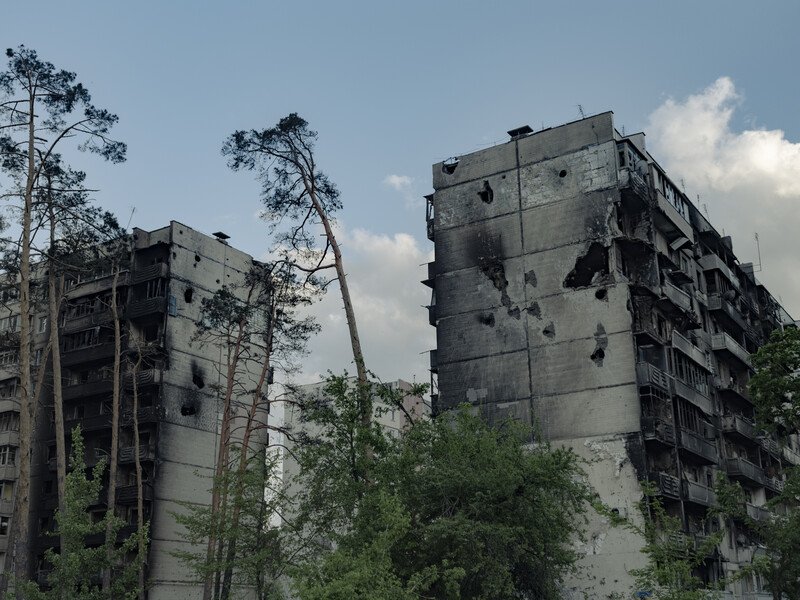
Destroyed houses in Irpin, Ukraine
And though the threat of Russians attempting to take Kyiv remained, many people felt it was time to come home. Since May, an increasing number of Ukrainians have returned, hoping that their houses are still standing. But some return only to find a pile of burned bricks and mortar.
The suburban town of Irpin saw some of the most brutal street fightings during the first days of the war. Because it wasn't taken, the Russian Army was unable to advance towards Kyiv.
Igor Soshnev, 54, stayed in Irpin the entire time. He was interested in cars all his adult life–he worked as a bus driver before the war and was known in town as the local car guy. Mr. Soshnev's most prized possession is a 1957 GAZ-69 , a Soviet all-terrain vehicle that he fixed up and kept in tip-top shape. He affectionately called it "My Gazik."
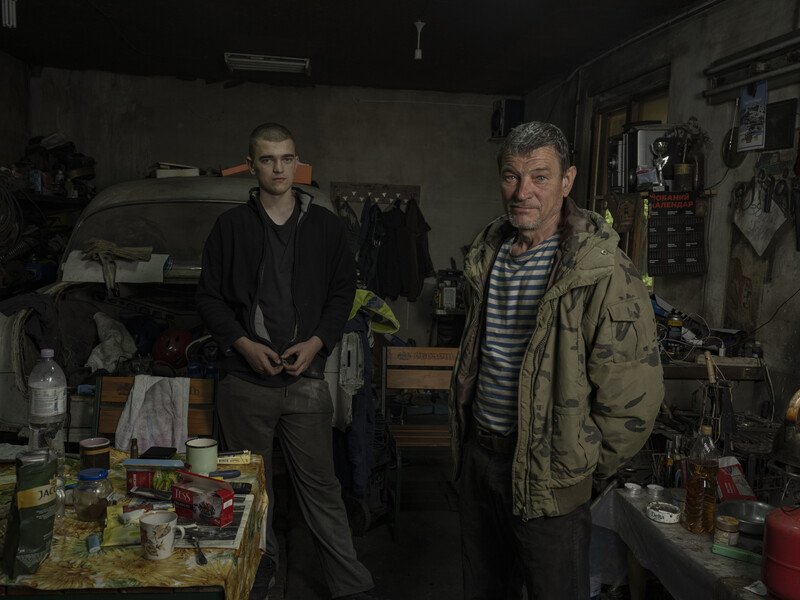
Igor Soshnev, 54 with his son Sasha, 17 at Igor's garage near the house that was destroyed by Russian artillery in March of 2022. Irpin, Ukraine
When the invasion started, he decided to stay. "I know this place like the back of my hand; I grew up here. I couldn't leave. I needed to stay and try to save it." Sending his family away, on February 25th, he went to a local military precinct with his friend Edik, the father of his goddaughter. The precinct, located in Bucha, is the next town over, but when they reached the building, they were told they didn't need volunteers.
Vova, a childhood friend of Mr. Soshnev and a veteran of the war in Donbas, stopped by the following day to check-in. Mr. Soshnev shared the frustration of being unable to volunteer, so Vova made a few calls and found out who needed people. In a few hours, Igor was issued an ID of the Irpin Territorial defense.
He hadn't held a gun since '86, the year he completed his mandatory Soviet Army service. Now he was holding a Kalashnikov again. "I felt like I was born with it," Igor recalls. He was assigned to man a checkpoint near Bucha. On the 29th, he had his baptism by fire, a shootout with a diversion group that came close to the checkpoint. After the exchange of fire, the Russians retreated.
On the 29th, the shelling started to intensify. They had their first wounded, whom Igor transported in his Gazik to the hospital, after which they were given the order to retreat towards Irpin and then Kyiv. Scooping up his new battle buddies, Igor escaped his treasured vehicle via a half-destroyed railway bridge, hopping between mangled railway tracks, train cars lying on their sides, and pierced concrete.
A few days later, he decided to come back to check on his house and see if there was anything he could do in Irpin; he felt useless sitting around in Kyiv. He was planning to make his way back through the railway bridge, but he didn't know that Ukrainian forces had since blown it up. As he approached the bridge, he was stopped by the Ukrainian Army. A fellow with a code name Pokemon said that Igor wouldn't be able to make it to Irpin and that he was commandeering all vehicles for the needs of the Army.
Igor handed over his keys to Pokemon. Walking home wearing his bright reflective jacket from his GAZ-69 enthusiast club, he cursed himself for coming back.
That night he couldn't sleep, tossing in his bed thinking about what would become of his Gazik. The following day, he returned to the checkpoint, where he reunited with Pokemon, only to find out that the car was sent to Horenka to evacuate the wounded. It wasn't coming back–the tank division that brought it there had to abandon it.
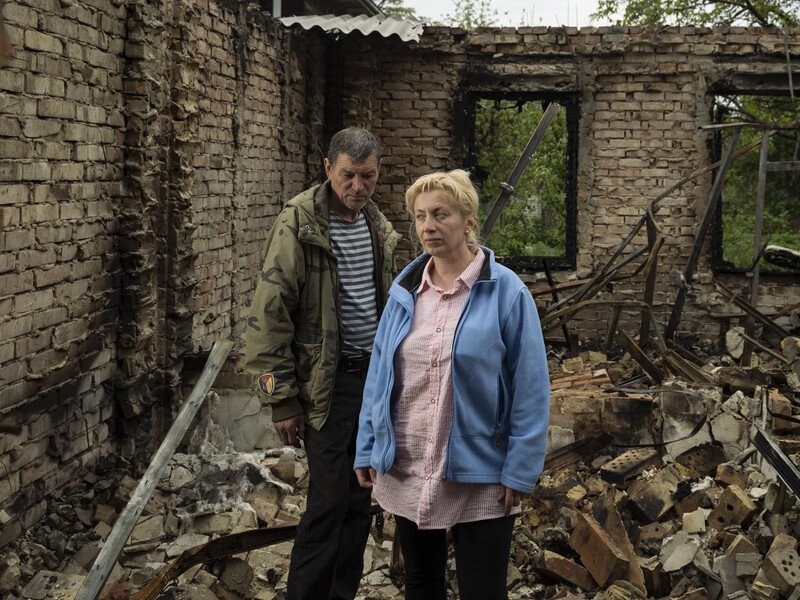
Igor Soshnev, 54 and his wife Oksana Soshneva, 47 at the site of their destroyed house in Irpin, Ukraine
Horenka is 8 km away. Igor decided to walk into the unknown to retrieve his Gazik along what was an extremely ambiguous separation line between Ukrainian and Russian troops. Artillery shells flying over his head, Igor walked to Horenka to recover his most treasured possession. And there it was, sitting on the side of the road, among the rubble of recent shelling and burning buildings–all in one piece, key in the ignition.
All car and railroad bridges to Irpin were blown up by then. Only one pedestrian bridge remained, not too far from where the railroad bridge stood a couple of days before.
Igor went on to check the dimensions of the pedestrian bridge. The Gazik could fit. The old 4x4 climbed the stairs of the bridge and made it through. He returned to his house in Irpin, and from that day, started running evacuations between Irpin and Kyiv. "I would do 6-7 runs a day. I was the only one that could do it. I would take as many people as I could with me to Kyiv and bring back some food, or whatever volunteers would give me there," Mr. Soshnev says. Local people nicknamed his route "A road of life."
On the night of March 21st, the first mortar landed on his house. It has hit the roof and damaged a room on the second floor. The explosion didn't wake him. The next day the house was hit again. This time he was lucky he wasn't inside–a projectile hit his home directly. He was in the garage and was knocked down to the floor. Running outside, he saw his house in flames. There were no emergency services to call. The house burned down in front of his eyes. His Gazik, which was sitting in the driveway, was destroyed.
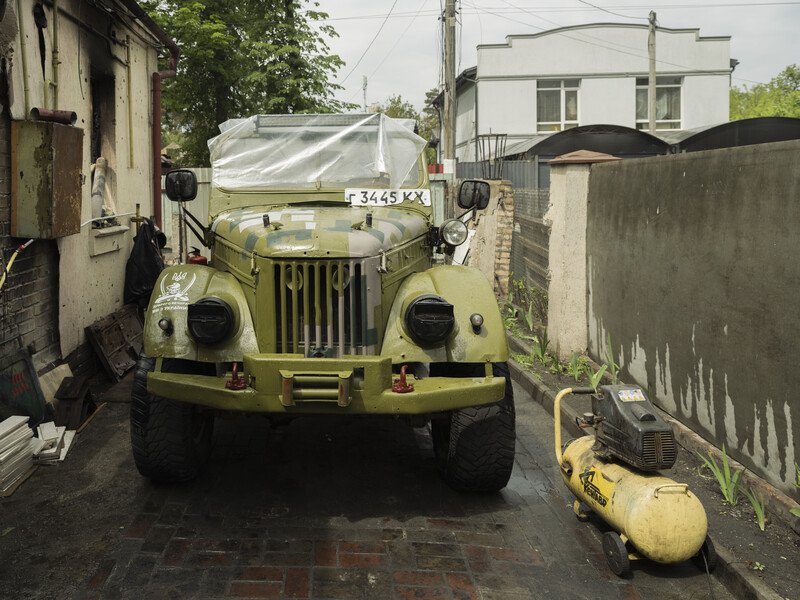
Igor Soshnev's 1957 GAZ-69 after restoration parked on the driveway next to his destroyed house in Irpin, Ukraine
"I was sitting on the sidewalk praying. I was hoping the flames wouldn't spread to the garage. That's all."
In April, Igor's wife, Oksana, 47, and his son Sasha, 17, returned home. The word about Igor's heroism has spread and the townspeople, his neighbors, friends, and people he has never met started offering help to restore Igor's Gazik. With spare parts from the Gaz-69 club and an old Volga engine, he and seven local mechanics fired up the Gazik once more on May 4. On May 8th, Igor rode through Irpin with a Ukrainian flag mounted on the roof.
Soon after, and across the street, Yurii Sikan, 59, and Darina Mikhailishina, 51, returned to their home to find it destroyed. They were two of the many people Mr. Soshnev transported via the lone pedestrian bridge. When the war started, they, like many other peaceful Ukrainians, couldn't believe they could be a target. This all changed during the first days of March when Darina saw Russian fighter jets flying low over their house, dropping bombs on nearby residential areas. They immediately decided to flee.
On March 25th, when they were in Uzhhorod, a town in Western Ukraine close to the Hungarian border, their neighbor contacted them with sad news. A missile had hit their house, and it was gone. On May 15th, Darina and Yuri returned, along with their cats. "They understand where they are but are very confused," says Darina "they know the door should be here and a window there, but it's all gone."
Their neighbor, a woman, named Tetiana, posted the couple's story on Facebook. Shortly after, a man they didn't know from the Poltava region donated a camper and drove it to Irpin. The trailer is now parked in their driveway. Darina, Yurii, and their cats all live in it, hoping to one day rebuild the house.
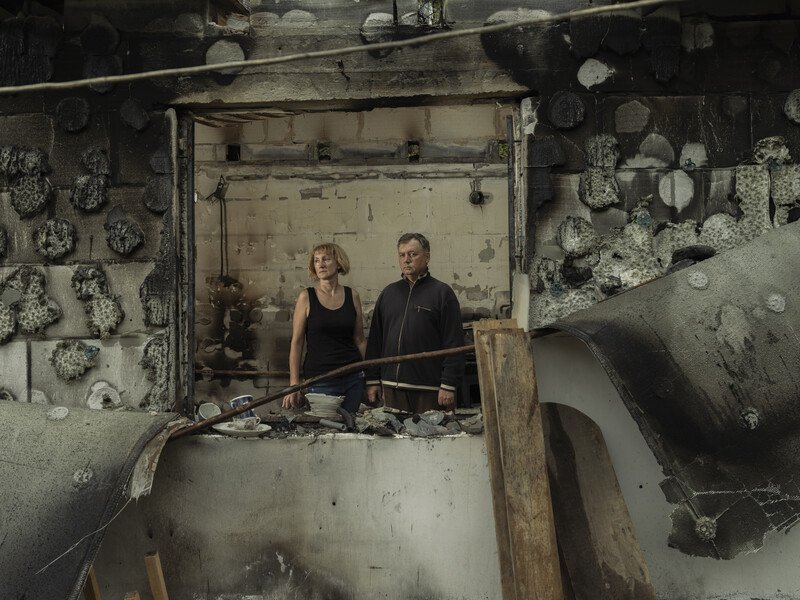
Yurii Sikan, 59 and Darina Mikhailishina, 51 standing in what used to be the kitchen of their destroyed house in Irpin, Ukraine
"When we came back, we saw that there was nothing left. Nothing. All memories, all our work, pictures of Yura's parents. It's all gone. All gone..."
As Winter approaches Darina and Yurii are seeking a new place to stay as the trailer will not be a reliable shelter during the cold. They put their names on a list for temporary shelter. As the government and city officials try to find a solution as to where to house thousands of people, Daria and Yurii's ticket most likely won't be drawn, as priority will likely be given to families with kids and those who have lost family members in the war.
Just a couple of blocks away was a co-op building with a cheeky name, Dub-ok (Dub means Oak in Ukrainian, and Ok still means Ok). Volodymyr Husak, 28, serves as head of the building's tenant association. Co-ops have become quite popular in suburban communities like Irpin, where middle-class families and young professionals settled as Kyiv grew more and more expensive. Mr. Husak was elected the head of his co-op in 2018 and managed the 44-unit building while working as a freelance system administrator in the IT field.
On February 24th, Volodymyr woke up at 5 am with a strange sense of uneasiness. A few minutes later, he heard jets flying over his apartment. Then the sounds of explosions. The ground was shaking. He understood that the war had started. "I called the family. Then I opened the building chat and messaged everyone to stay away from windows and seek shelter". At 10 am, he went to a meeting at Irpin's city hall where it was to be decided what to do.
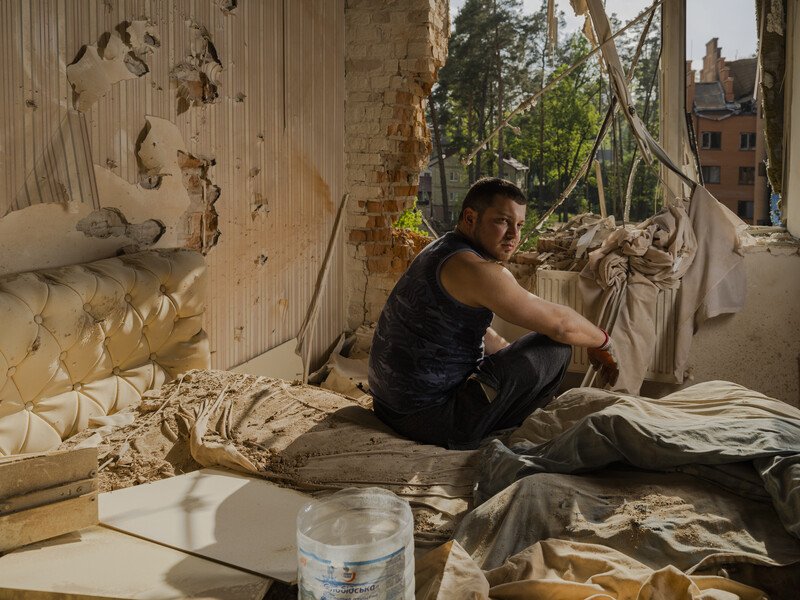
Volodymyr Husak, 28 at one of the apartments in the Dub-ok co-op building in Irpin, Ukraine
About half of the tenants from Voldymyr's co-op had fled on that date, and those who remained slept on the basement level in the make-shift bomb shelter. Volodymyr himself volunteered to distribute humanitarian aid that started arriving almost immediately from Kyiv and helped with evacuations. "First days I barely slept," he remembers of the first days of the war.
By March 4th, only seven people remained in the building. On March 5, Mr. Husak was returning from Kyiv and was denied entry back to Irpin by the Ukrainian military–street fights with the Russians had reached the center of town. He went to Bila Tserkva, a small village near Kyiv. He continued volunteering, organizing evacuations from Irpin via phone, and arranging humanitarian aid and food delivery to the areas where it was possible.
On March 5th, the apartment building was shelled. Five people were inside, and luckily none were harmed. One of them ran outside and called Mr. Husak. With the words "the roof is burning..," the cell service cut out. He couldn't reach any of the neighbors after that.
When the Russian Army retreated from the area and the town of Irpin was relatively safe to return to, Volodymyr started commuting back and forth daily. His work now consisted of helping people who wanted to return and start rebuilding. He later moved into his friend's home in Irpin, which survived the invasion.
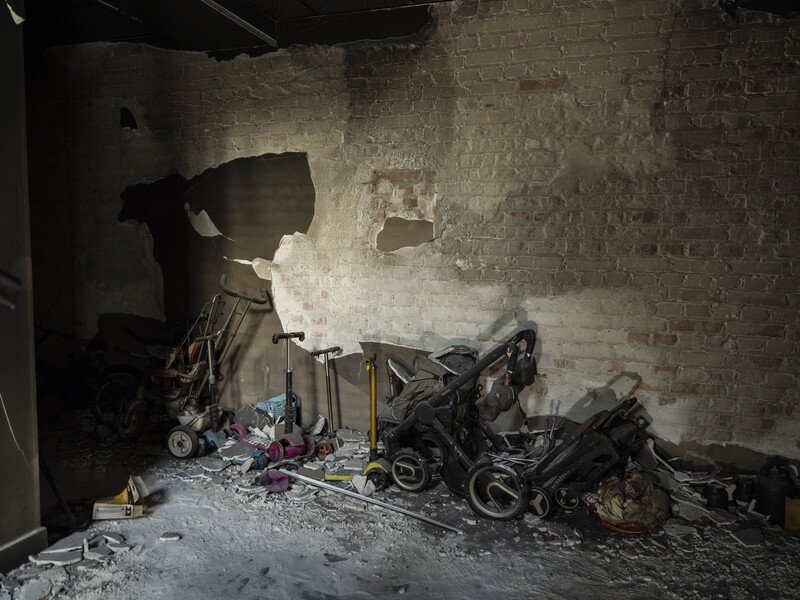
Destroyed Dub-ok co-op building in Irpin, Ukraine
Recently, the tenant association calculated the repair cost, which amounted to 18 million Hryvnias, about half a million USD, an impossible amount for the residents of Dubok co-op to raise. The government doesn't have the means or resources to start repairing buildings like theirs as the war still rages on in other regions of Ukraine. Mr. Husak is looking for a solution to curb the damage and hopes for government assistance in the future. "Once the legislative process is in place we're gonna decide what to do. Right now the war is still on so I don't have much hope the government will have the money for rebuilding."
On the other side of Irpin sat the building where Yulia Nelubova, 44, bought an apartment for herself and her three children nine years ago. Yulia is a singer who has been with the Veryovka Ukrainian National Folk Choir for 20 years. The chorus was planning its upcoming tour season just before the war started.
Now, standing in the middle of her burned-out apartment, she is in disbelief. "Maybe it's a defensive reaction, but I can't fathom all this. It seems unreal. Like I will wake up tomorrow, and it was all a bad dream," Ms. Nelubova says. But unfortunately, it is real. Her first-floor apartment bought as a sanctuary for her family, is gone.
"I am still drawn here," she says of the town of Irpin, its parks, and abundance of nature. When the full-scale invasion began in February, Ms. Nelubova didn't want to leave. Even after the internet, electricity, and water were cut off, with fighter jets flying low over her building, she still resisted the idea they could be harmed. "You say to yourself, it's nearby, it's not gonna touch us," she recalls of the first days of war.
On March 25th, she received a text message from a neighbor with a video of their house smouldering. "At first I thought it's the other side [of the building] but then recognized my apartment... My heart dropped." Ms. Nelubova was in Vinnytsia oblast in Western Ukraine by that time, but she couldn't find peace. Leaving the rest of her family in safety, she returned to Irpin shortly after it was liberated.
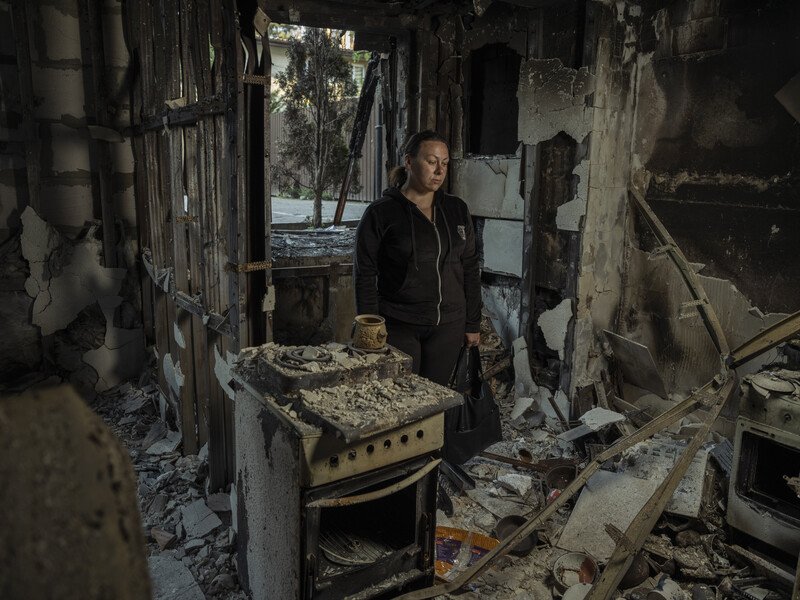
Yulia Nelubova, 44 in her apartment that was destroyed by Russian bombings of Irpin, Ukraine
"We got a generator from our boys from the Territorial Defense, had some coffee with neighbors sitting in front of our burned-out building," Mrs. Nelubova talks about the first hours of her return. And even though her spirits were high, her heart was broken. When she came back home, she was still hoping to find some things intact. But everything had burned.
"I couldn't even cry anymore. I was just standing in the middle." Yulia sews her traditional dresses, and in the apartment, there were many garments she treasured, ones she made herself and others she inherited. The most prized possession in her family, a traditional wedding dress that belonged to her great great grandmother, has burned with everything else. Besides the heirlooms and personal possessions, she lost a year's worth of medicinal supply for her oldest son, who is recovering from cancer and suffers from Hepatitis B.
Now her kids have returned, as well as her 70-year-old mother. They rent an apartment nearby. When they moved, it had no windows left. All of the glass had been shattered by shelling. In Irpin, like in many other towns that saw heavy combat, items in high demand include window glass, doors, plywood, and tarps. Local window shops are working non-stop to salvage glass and repurpose it. Iryna found a man who to patch together some double-glazed windows from bits and pieces that he had collected from destroyed buildings.
A Ukrainian health agency found some medicine for her son, and her chorus started collecting money for his continuing treatment. Ms. Nelubova is still in disbelief but reassured by the strength and kindness of the people around her.
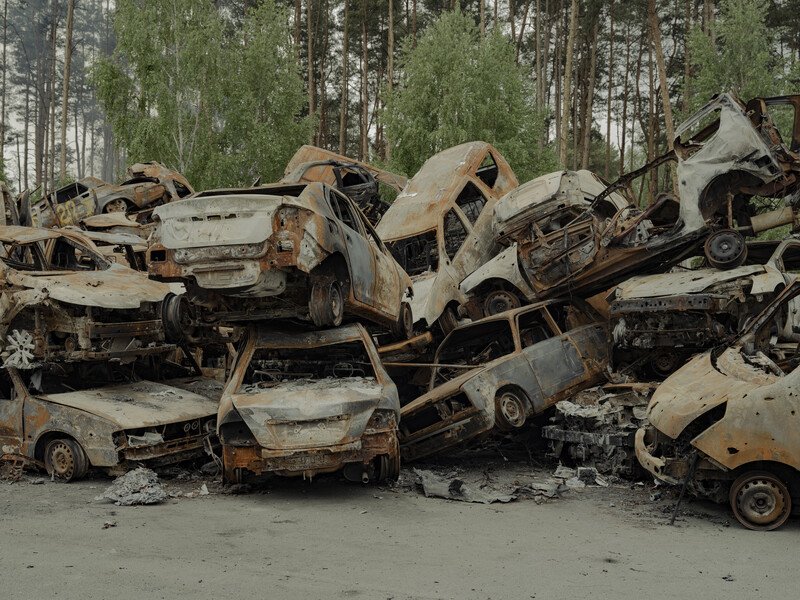
A pile of burned and destroyed vehicles near Bucha, Ukraine
Irpin became a stronghold that Russian troops failed to breach, but it still suffered greatly. Oleksandr Markushyn, the mayor of Irpin said that 70% of the town had been destroyed due to fighting, mainly from Russian shelling. Now the city is planning to buy out an apartment complex from a developer to start resettling affected families and build several new buildings. As of August 22nd, the Irpin town council was preparing to settle the first 29 families, prioritizing those who had lost family members in the war.
As the war is still highly hostile across the front line, which stretches almost 2,500 kilometers, the Ukrainian government hasn't developed a specific plan to start rebuilding the residential areas. Affected cities or towns take the initiative and try to devise either temporary solutions.
In Bucha, the town separated from Irpin by a short drive, one of the first modular housing complexes is now operational and hosting over 300 people. It's not nearly enough to accommodate everyone who has lost their homes. Bucha suffered from the Russian occupation immensely; almost 1500 houses and 250 apartment buildings were either damaged or destroyed. Bucha also carried the heavy toll of civilian population casualties and continues to be an active site of an investigation into shocking war crimes perpetrated by the Russian forces.
A small suburban town of about 28,000, Bucha has become an attractive place to start a family. Alla Serebina and Andrii Kuziukov moved into their first apartment three years ago and have slowly decorated and fixed things up. On the evening of February 23rd, they were online shopping for a new chandelier for the kitchen.
"This is our family nest," Alla says, "Our soul."
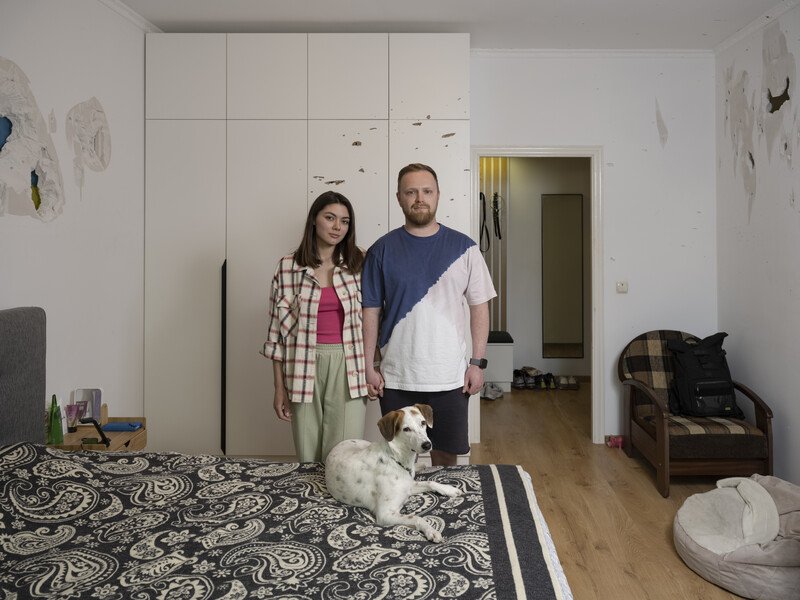
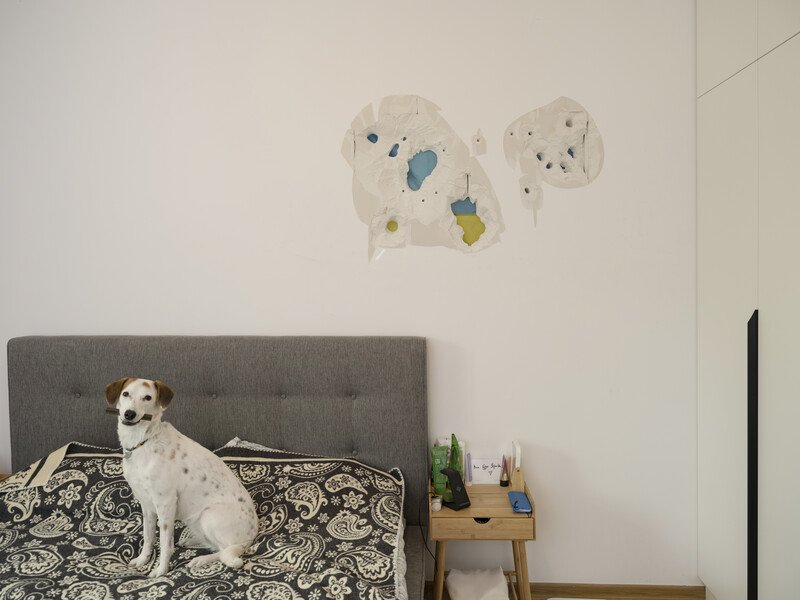
Alla and Andrii were sitting in their kitchen searching for a chandelier online. Not finding one they could order, they made plans to go shopping the next day. Less than 4 hours later, they were woken by explosions.
Hostomel, a town a few kilometers away, had encountered the first heavy fighting because of its airport, where Russian paratroopers were attempting their first landings and assaults. Alla and Andriy, were now looking at Russian helicopters trying to land in Hostomel. The windows were shaking from explosions, gunfire crackling in the darkness of the night. Utah, a rescue dog they adopted two years ago, was barking.
A feeling of complete loss has overwhelmed them. Panicked, Alla and Andriy started throwing things in suitcases. Shortly after, they were sitting in standstill traffic, trying to leave Kyiv on the chaotic morning of February 24th. After staying with eight other friends in Vinnitsa Oblast for a couple of days, they headed further into Western Ukraine where a family friend offered them refuge.
They were able to breathe out for a short while. But Andrii's father decided to stay in Bucha, which was now occupied with no cell or internet service. Andrii tried to find out every day if his father was still alive. "You just ask anyone you can get ahold of somehow, through however many connections, if they saw him. It was awful." Luckily, he survived. Later, when Andrii and Alla returned, he told them he had been detained by Russian soldiers twice.
Towards the end of March and beginning of April, images of Russian atrocities in Bucha were circulating on every media outlet. Alla and Andrii were pained to realize that their hometown would never be the same.
"When I saw those images, my reaction was complete disbelief," Alla says. "Everyone was reposting pictures. I just wanted to shut myself down. I couldn't believe that other humans can do that to other humans... How is it possible? They live in towns like ours, they have houses, they have families. How could they do this? I'll never understand that."
Once the Russian Army left Bucha Andrii's father went to their apartment. They already knew that would be damage. Their security system had sent them an "intrusion" warning shortly before the internet disappeared, but they had no idea the scale of the damage.
Most likely, a tank round was shot at their building, went through the window and three walls, and ended up stuck between the bathroom tiles.
"We wanted to redo the bathroom anyway," says Andrii.
Russian paratroopers attempted to land in Hostomel on the first day of the full-scale invasion planning to launch an attack on Kyiv while using the airport as their base. Oleg Golovatyj, 44, lived with his family in the apartment he inherited from his father. His father was an officer in the Soviet army, and Hostomel was a closed military town where many military families settled after being awarded apartments by the Soviet State. After Ukraine gained its independence in 1991, Hostomel was opened. The former army base became home to the Antonov planes, including the biggest cargo aircraft in the World, Mriya, which was destroyed by the Russian attacks on the airport.
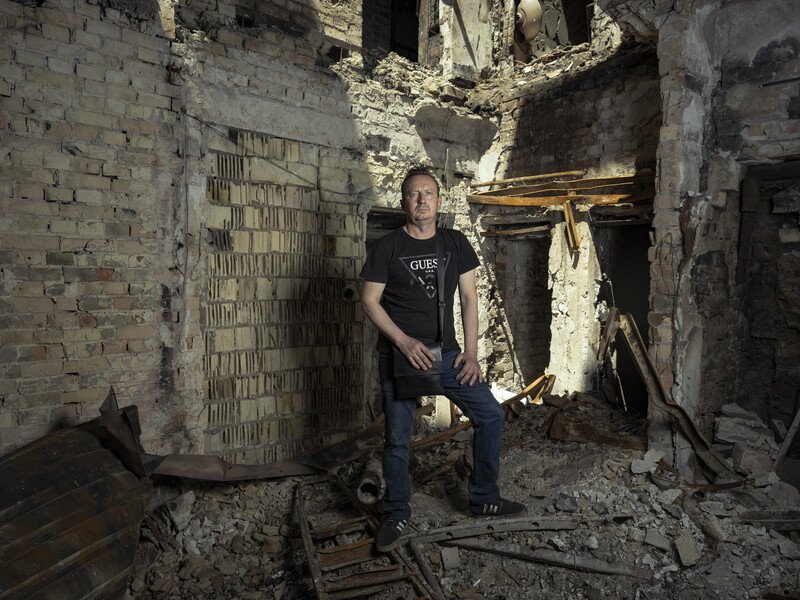
Oleg Golovatyj, 44 in what used to be the living room of his family's apartment in Hostomel, Ukraine
Oleg's family lived just a block from the airport, making his house vulnerable to potential shelling. Coming from a military family, he understood they had to leave immediately. He first took his family to Bucha, where they had a little cottage. But it wasn't safe there either.
Mr. Golovatiy is a civilian and worked as a repairman at the local military unit, the same unit where his father served. That made him vulnerable. Russians entered Bucha on February 27th, and soon after, Russian soldiers were knocking on the door of their dacha. "I have to say they were overly polite and gave us instructions on what to do or what not to do," says Oleg about the interaction. They were told that they wouldn't be harmed if they adhered to the occupation rules, and that it would all be over soon.
The next day, they decided to head toward Kyiv. The family got into Oleg's 1999 VW Golf 4 Universal without knowing the situation on the road. His wife Yelena and their son Sergii, 13, his elderly mother Nadezhda Ivanivna, and himself, headed into the unknown, joining the caravan of cars trying to leave familiar streets now littered with shrapnel and broken glass. Burned-up tanks smoldered, and civilian vehicles, riddled with bullet holes, were strewn about the road like toys.
They had no idea what lay ahead. On the way, they saw bodies lying by the side of the road, destroyed buildings that had still stood a couple of days ago. The first Russian checkpoint was the worst, Oleg says. "It was Buriats, they made me take off my clothes, searched everything, went through my phone, and threw away the sim card ." Oleg had already cleaned up his phone, deleting all contacts associated with the Army base he worked at, pictures with Ukrainian service members, and anything else that may have given away his military affiliations.
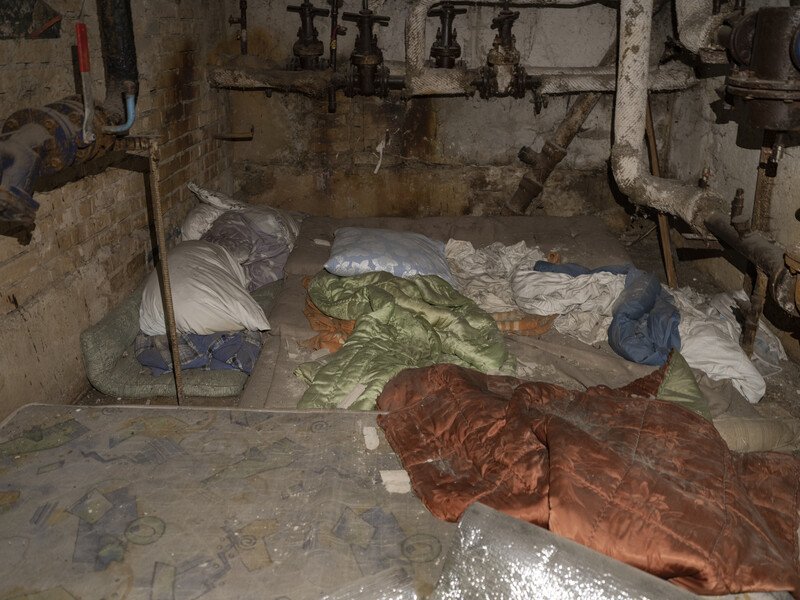
Abandoned sleeping bags in the basement of a partially destroyed apartment building near Antonov airport in Hostomel, Ukraine
The trip to Kyiv, which would typically take about half an hour, took all day, but they made it out. Oleg remembers the moment he saw the first Ukrainian checkpoint, tears rolling down his cheeks, "We got out."
Once Oleg and his family reached Kyiv, they were met by a friend who let them stay in their apartment for a week. Oleg's family then left for the West of Ukraine, but he stayed behind, enrolling in a local Territorial Defense unit. Yelena was upset, even offended.
In Kyiv, a stranger discovered they needed a place to stay and offered an empty apartment. On arrival, volunteers gave Yelena and Sergii free clothing, and Oleg's mother was provided with necessary medicine. Oleg was overwhelmed by the kindness shown to him and his family, and now, looking back, he posits, "I sometimes think to myself if I would ever let a total stranger just move into my place."
On April 14th, Oleg returned to Hostomel. He found out that his house had been destroyed earlier in March when he saw satellite images posted to one of the town chats and videos from neighbors. Oleg hadn't had time to mourn his family apartment among all the commotion. When he finally saw it with his own eyes, the sadness overwhelmed him. "All was gone. But mostly my heart was breaking for my son's drawings. He really treasured them. Even won a contest..."
On the other side of the Romanivsky bridge sits the village of Horenka. Horenka was never occupied, as the Russian Army couldn't cross the bridge, which became a symbol of Kyiv's defiance. But that was not enough to spare the village from intense shelling.
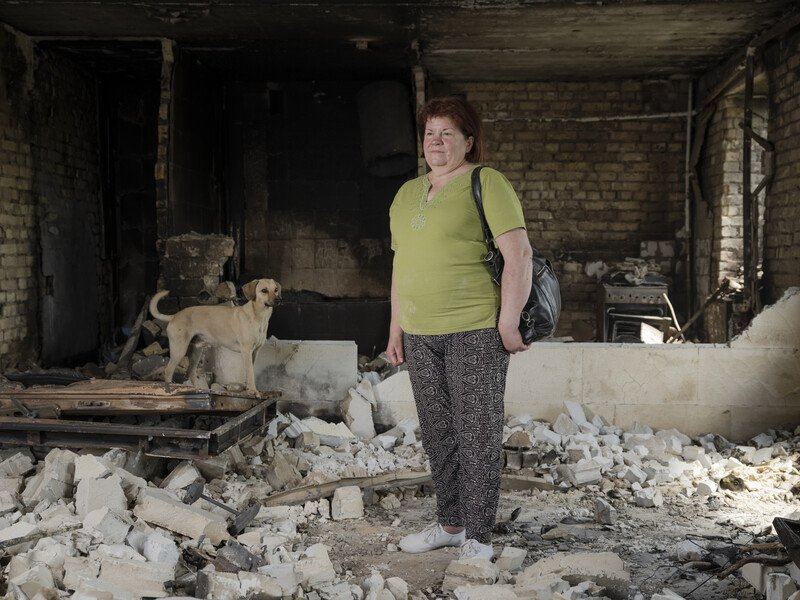
Velentyna Briakana, 55 and her dog Bucks in the destroyed apartment they used to live in before the Russo-Ukrainian war. Horenka, Ukraine
Velentyna, 55, lived in her two-bedroom apartment with her son, daughter with her husband and three grandchildren, and a recently adopted puppy named Bucks. On March 4th, during the mandatory evacuation, they all jammed into one car driven by a volunteer from Kyiv but had to leave Bucks behind. He cried, running after the car as it joined the stream of vehicles heading towards Kyiv. For her grandchildren, it was a crushing heartbreak.
They were evacuated to the Khmelnytsky region. A local family gave them a house and provided food and necessities. And at the end of March, she received a text message from her neighbor that said, "Look what has happened to your apartment," with a few pictures attached. She saw a hole in the building where her apartment used to be. Earlier it was hit by a Russian mortar shell, which landed right in her living room. Just a month ago, she was playing with her grandkids there. Valentyna broke down in tears, wailing.
"I worked for this place all my life, and it's gone in one split second, " she says, standing in the middle of the rubble, pointing out where their belongings had once stood. Bucks, excited every time she visits, leaps from the front door, which now lays mangled on the floor, into what used to be the living room.
Valentyna, who returned at the end of April, now lives in Kyiv. The building where she works as a concierge provided her with a room. She comes to Horenka to take pictures of her scarred building to start the process of filing for government assistance as a person who has lost their home.
According to Iryna Vereshchuk who serves as a Minister of Reintegration of Temporarily Occupied Territories, more than 800,000 are unable to return to their destroyed or damaged homes. According to multiple officials, the Ukrainian government is working on implementing systems to track the damage and is planning to restore as many as they can. But tens of thousands of Ukrainians will never be able to return to or raise their homes.
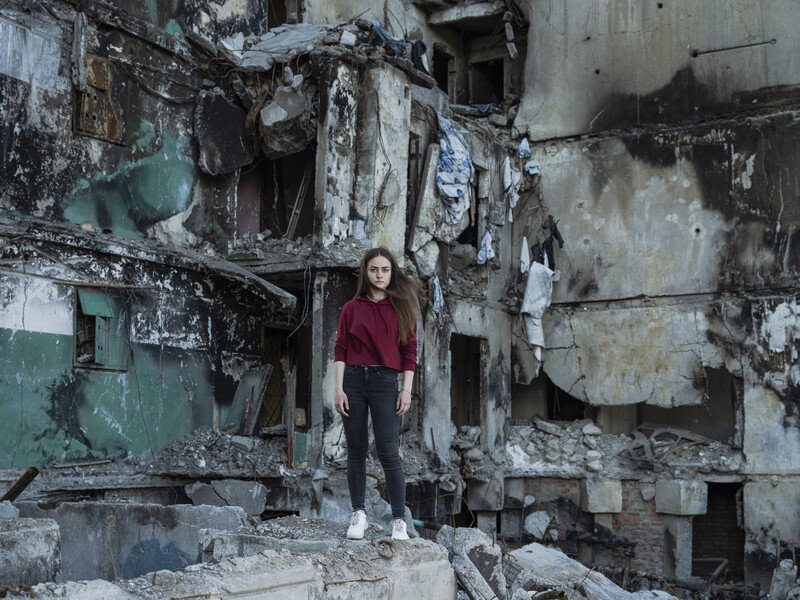
Katya Baranivska, 22 standing in front of the destroyed building where her family's apartment used to be before it was destroyed by a Russian bombing. Borodyanka, Ukraine
One of them is Katya Baranivska, 22. She is standing in front of the apartment building where she grew up. She moved out just two months before the building was destroyed, renting a small flat a couple blocks away in Borodyanka.
Borodyanka, a town of 12,500 residents, is about 30 kilometers away from Irpin towards the Belarussian border. On February 26th, the air rides began in Borodianka, and the first bombs were dropped on the village. On that day, as Russian tanks approached the village, facing resistance from the town's Terriortial Defense units, Katya's family hid in a bomb shelter under a local school.
On March 2nd, their home was bombed. "We understood at that point that there is nothing else for us here and decided to leave," says Katya. As her father drove out of Borodyanka, Katya watched the crater smolder in their apartment building. An hour ago, it was intact; now, a Russian missile had destroyed the home she made her first steps.
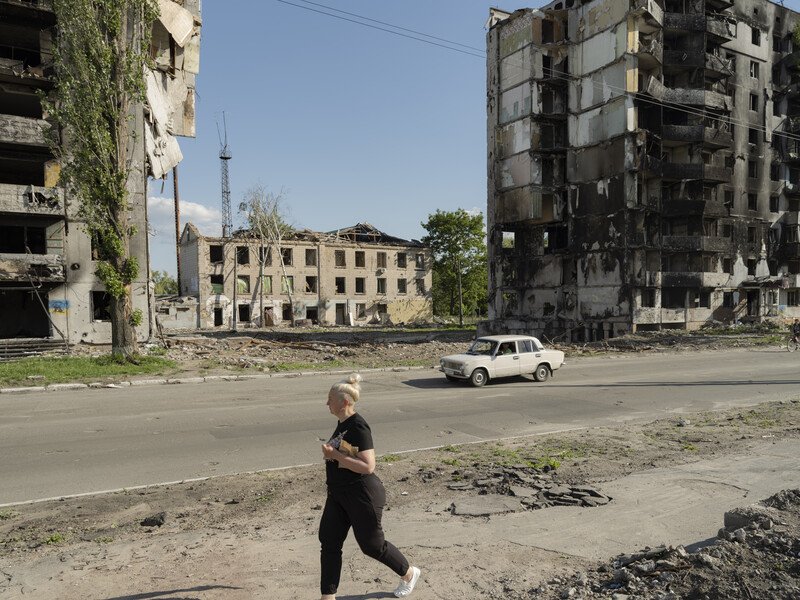
Destroyed buildings in Borodyanka, Ukraine
"It was very. hard for all of us. Very hard..." says Katya about the day they were leaving. "But we were all together, so that's what really mattered."
They headed for Vinnytsia. The ride was silent. Katya, her parents, and her boyfriend left the town where they spent their whole lives without knowing what would come next. In May, after Borodyanka was de-occupied, they returned.
"It's very difficult to come back," says Katya about returning to the site where her parent's home was destroyed. "All our family memories, pictures, heirlooms - it's all destroyed ."Katya couldn't bring herself to go near the house after returning to Borodyanka. She attempted to walk over several times and observed from a distance until one day, clutching her fists, tears in her eyes; she walked into what used to be their courtyard. Her parent's bedroom in their eighth-floor apartment was exposed on the side of the building like an open wound. The bed was still made.
click to view the complete set of images in the archive
